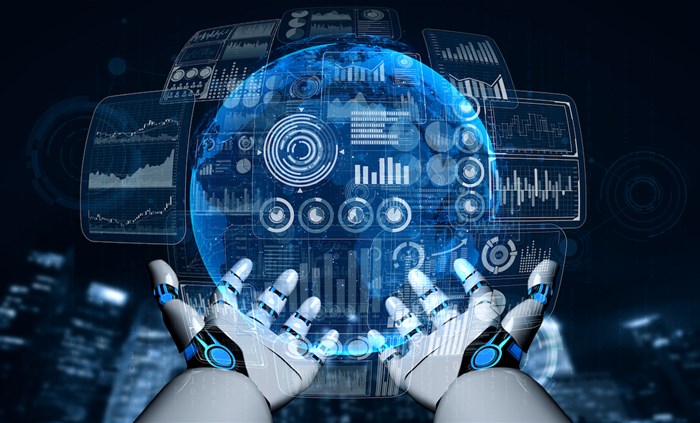The software product development industry is constantlygrowing, driven by innovation and the undying pursuit of better user experiences. Deep learning, is a sub specialization of artificial intelligence (AI), which has turned out to be as a powerful tool for software product development companies, transforming the way products are planned, built, and delivered. This blog explores how deep learning is revolutionizing the software scenario, with a keen focus on its applications for software product development companies.
Demystifying Deep Learning
Despite the name, deep learning is based on artificial neural networks, which are very loosely inspired by the brain’s own neural network – i.e.neurons linked together in intricate structures. Deep learning networks are trained on immense data sets until they learn the relationships that characterize the data. Eventually, they learn how to do things remarkable things such as recognize images, process natural language and even produce poetry and art.
Here’s how deep learning is impacting software development across various stages:
Idea Generation and Market Research: Deep learning can read and analyze user behavior, track sentiment on social media, and learn market trends to identify potential product loops holes and opportunities. This data-driven approach helps companies focus on creating software that actually works and addresses user needs. Product Design and Prototyping: Deep learning algorithms can be used to generate initial prototypes and mockups based on user preferences,acceptance patterns and design principles. This allows for faster changes and testing of different design ideas, ultimately leading to a more user-centric product. Software Development and Functionality: Deep learning plays an important role in making intelligent software features. For example, deep learning empowers chatbots that provide great customer support, recommendation engines personalize user experiences, and anomaly detection systems make sure software stability.
Cutting-Edge Deep Learning Techniques for Software Products
Software product development companies are leveraging several cutting-edge deep learning techniques:
Generative Adversarial Networks (GANs): GANs incorporates of competing neural networks. One community that is a generator creates new data like pictures, code snippets, at the same time as the opposite one is a bifurcator which attempts to bifurcate actual facts from the generated records. This non-stop competition sharpens the generator’s capability to provide an increasing number of practical outputs, which can be used for tasks like developing practical product mockups or generating test data for software functionalities.
Reinforcement Learning: This method consists of educating an AI agent by trial and error in a simulated environment. The agent knows and learns from its successes and failures, slowly however gradually optimizing its behavior to acquire a selected purpose. Reinforcement studying can be used to expand software that communicates with dynamic environments, like chatbots that learn how to personalize their responses to consumer behavior or recreation AI that adapts to player strategies. Natural Language Processing (NLP): Deep learning has revolutionized NLP, strengthening software product development to apprehend and reply to human language with unparalleled accuracy. This is used in chatbots, digital assistants, sentiment analysis tools, and software that communicates with voice commands.
The Impact on Software Product Development Companies
The adoption of deep learning with AI software development expertise offers a multitude of benefits for software product development companies:
Enhanced User Experience:Deep learning allows to create software products thatforesees user needs, gives personalized experiences, and offers intuitive interfaces. This helps in higher user engagement and satisfaction. Improved Efficiency and Productivity:Deep learning can automate recurring/repetitive tasks in the development, giving developers time to focus on more creative work. Besides, faster prototyping and testing cycles lead by deep learning can helping them to get quicker time to market. Data-Driven Decision Making:Deep learning offers companies a room to analyze huge amounts of user data, providing valuable insights for product improvement and future development strategies.
Examples of Software Product Development Companies using Deep Learning
Several leading software product development companies are at the forefront of deep learning adoption:
Adobe uses deep learning for its Creative Cloud suite, empowering features like content suggestion and automatic image editing. Netflixharnesses deep learning for its recommendation engine, it personalizes content suggestions based on the users viewing preferences and history. Amazonexercises deep learning for various applications, including product recommendations, fraud detection, and voice recognition with Alexa.
However, implementing deep learning requires significant expertise, computational resources, and access to large datasets. This can be a challenge for smaller companies.
The Road Ahead: Challenges and Opportunities
Deep learning offers immense potential for the future of software development. However, certain challenges need to be addressed:
Ethical Considerations: Partiality in training data can lead to biased outputs from deep learning models. Software product companies need to make sure of ethical development practices that can avoid perpetuating discrimination. Explainability:Deep learning models can be complex and non-transparent. Developing methods for explaining the reason and logic behind deep learning decisions is crucial for building trust with users. Accessibility:The resources required for deep learning implementations can be a huddle for smaller companies. Making deep learning tools and training more accessible will be key to broader adaptation in software development company landscape.
Despite these challenges, the opportunities offered by deep learning are undeniable. Software product development companies that embrace deep learningwill be well-positioned to develop innovative and user-centric products that shape the future of software. Here are some ways companies can navigate the landscape:
Building Internal Expertise:Investing in training programs and hiring data scientists and deep learning engineers will be crucial for successful implementation. Collaboration with AI Firms:Partnering as well as arranging for mentorship from specialized AI firms can provide key access to expertise and resources for software companies that lack them in-house. Leveraging Open-Source Tools:Using open-source deep learning frameworks like TensorFlow and PyTorch can help software product development companies to experiment and develop deep learning applications without huge and upfront investment.
Conclusion
Deep learning is rapidly transforming the software product development scene. By leveraging the strength of deep learning, software product development companies can release a brand-new era of innovation, create intelligent software solutions, and deliver unparalleled consumer experiences. As the era matures and becomes handier, we will anticipate to look even deeper groundbreaking applications emerge, shaping the future of software and the reports it can provide.
Related Items:Future of Software, Product Development Recommended for you The Importance of Market Research in Product Development How Can Startups Harness AI for Innovative Product Development? How Do Businesses Prioritize Innovation in Product Development?



